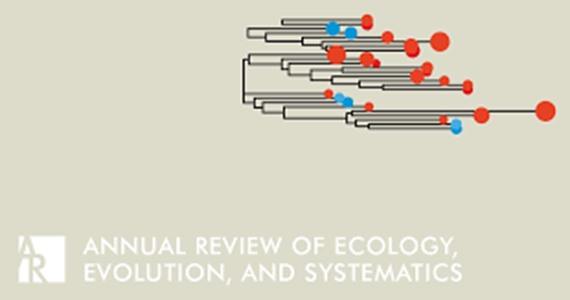Causes and Consequences of Apparent Timescaling Across All Estimated Evolutionary Rates
IF 11.2
1区 生物学
Q1 ECOLOGY
Annual Review of Ecology, Evolution, and Systematics
Pub Date : 2021-09-08
DOI:10.1146/annurev-ecolsys-011921-023644
引用次数: 14
Abstract
Evolutionary rates play a central role in connecting micro- and macroevolution. All evolutionary rate estimates, including rates of molecular evolution, trait evolution, and lineage diversification, share a similar scaling pattern with time: The highest rates are those measured over the shortest time interval. This creates a disconnect between micro- and macroevolution, although the pattern is the opposite of what some might expect: Patterns of change over short timescales predict that evolution has tremendous potential to create variation and that potential is barely tapped by macroevolution. In this review, we discuss this shared scaling pattern across evolutionary rates. We break down possible explanations for scaling into two categories, estimation error and model misspecification, and discuss how both apply to each type of rate. We also discuss the consequences of this ubiquitous pattern, which can lead to unexpected results when comparing rates over different timescales. Finally, after addressing purely statistical concerns, we explore a few possibilities for a shared unifying explanation across the three types of rates that results from a failure to fully understand and account for how biological processes scale over time. Expected final online publication date for the Annual Review of Ecology, Evolution, and Systematics, Volume 52 is November 2021. Please see http://www.annualreviews.org/page/journal/pubdates for revised estimates.在所有估计的进化速率中明显时间尺度的原因和后果
进化速率在连接微观和宏观进化中起着核心作用。所有的进化速率估计,包括分子进化速率、性状进化速率和谱系多样化速率,都与时间有相似的比例模式:在最短的时间间隔内测量的速率最高。这造成了微观和宏观进化之间的脱节,尽管这种模式与一些人可能期望的相反:在短时间尺度上的变化模式预示着进化具有创造变异的巨大潜力,而这种潜力几乎没有被宏观进化所利用。在这篇综述中,我们讨论了跨进化速率的共享缩放模式。我们将缩放的可能解释分为两类,估计错误和模型错误说明,并讨论如何将两者应用于每种类型的速率。我们还讨论了这种无处不在的模式的后果,当比较不同时间尺度上的比率时,它可能导致意想不到的结果。最后,在解决了纯粹的统计问题之后,我们探讨了三种类型的速率共享统一解释的几种可能性,这些速率是由于未能充分理解和解释生物过程如何随时间扩展而产生的。预计《生态、进化和分类学年度评论》第52卷的最终在线出版日期为2021年11月。修订后的估计数请参阅http://www.annualreviews.org/page/journal/pubdates。
本文章由计算机程序翻译,如有差异,请以英文原文为准。
求助全文
约1分钟内获得全文
求助全文
来源期刊
CiteScore
19.90
自引率
1.70%
发文量
21
期刊介绍:
The Annual Review of Ecology, Evolution, and Systematics is a scholarly publication that has been in circulation since 1970. It focuses on important advancements in the areas of ecology, evolutionary biology, and systematics, with relevance to all forms of life on Earth. The journal features essay reviews that encompass various topics such as phylogeny, speciation, molecular evolution, behavior, evolutionary physiology, population dynamics, ecosystem processes, and applications in invasion biology, conservation, and environmental management. Recently, the current volume of the journal transitioned from a subscription-based model to open access through the Annual Reviews' Subscribe to Open program. Consequently, all articles published in the current volume are now available under a CC BY license.

 求助内容:
求助内容: 应助结果提醒方式:
应助结果提醒方式:


